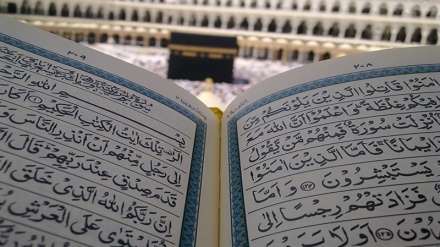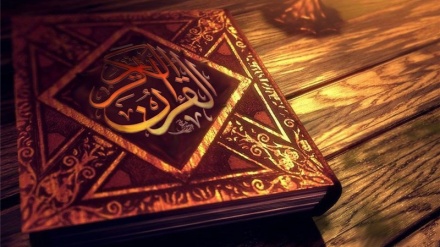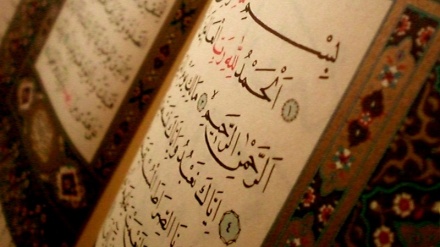Path towards Enlightenment (1032)
Welcome to our latest episode of “Path towards Enlightenment”, which is an endeavour to make you and us familiar with an easy and fluent explanation of God’s Final Scripture to all mankind, the holy Qur’an that was revealed to the Last and Greatest of all Messengers, Prophet Mohammad (blessings of God upon him and his progeny).
As you know for the past few weeks we have been explaining “Surah Haaqqah” – the number 69 in the serial order of compilation of the holy Qur’an. Revealed in Mecca, it has 52 Ayahs and opens by proclaiming one of the names of the Day of Resurrection, that is, al-Haaqqah or The Inevitable Reality, so named because the matter of truth in every affair shall forever be decided on Judgement Day. It describes punishment in the transient life of the mortal world for disbelievers as well as the more terrible fate that awaits them in the Hereafter. The bliss of Paradise to be enjoyed by the believers is eloquently contrasted with the torments of Hell for the disbelievers. The truth of the Holy Qur’an and the Prophet of Islam is also confirmed. The Surah is also known as The Concrete Reality, The Catastrophe, The Indubitable, The Inevitable Hour, The Sure Occurrence, and The Undeniable.
It is narrated from the Prophet that recitation of Surah Haaqqah lessens the burden of sins. It is narrated from Imam Mohammad Baqer (AS), the Prophet’s 5th Infallible Heir, that it is incumbent to recite this Surah many a time, since its recitation in the ritual obligatory and supererogatory prayers serves as a token of belief in God Almighty and His Messenger; and whoever recites it, his/her faith shall remain intact until Resurrection provided that religious obligations are fulfilled.
We continue from where we had left you in the last episode ‘Path towards Enlightenment’, and here are Ayahs 25, 26, 27, 28, and 29:
“But as for him who is given his book in his left hand, he will say, ‘I wish I had not been given my book,
“Nor had I ever known what my account is!
“I wish death had been the end of it all!
“My wealth did not avail me.
“My authority has departed from me.’”
If you might recall, in the last episode of ‘Path towards Enlightenment’, in our explanation of the previous Ayahs of this Surah we said that on Judgement Day the true believers who were virtuous will rejoice and feel happy on being given the book of their deeds in the right hand. They will thus enter the eternal bliss of Paradise which has unimaginably beautiful gardens abounding in a variety of delicious fruits which are in easy reach without the trouble of making efforts to procure them. As is clear, faith in the Prophet of Islam and his Infallible Successors is the passport to Paradise and immunity from the fires of Hell.
The Ayahs that we recited to you now refer to the fate of the disbelievers and those who had belied the mission of the Prophet of Islam and his Infallible Successors. They will be given the book of their deeds in their left hand and will express deep regret but there is no salvation now since they had failed to use the ample time given to them for reflection, reform, repentance and return to the right path during the transient life of the mortal world by the All-Merciful Lord. They will wish that if only death had ended and erased all the sins and evil they had done. In short, neither wealth nor high positions shall be of any avail on that Day, since such miserable creatures shall stand with utmost ignominy and disgrace before the Divine Tribunal. There shall be no means of deliverance from such dire fate.
These Ayahs teach us the following points:
- The Day of Judgment is not the time for repentance; hence the expression of regret by the disbelievers, the wicked, and the unrepentant sinners will be in vain.
- Awareness of the consequences of deeds is a vital factor in awakening the conscience and choosing the right path so as to achieve salvation in the Hereafter and be safe from the eternal punishment.
- Wealth and power are of no use on the Day of Resurrection.
Now let us listen to Ayahs 30, 31, 32, 33, and 34 of the same Surah:
“Seize him and fetter him!
“Then put him into hell.
“Then, in a chain whose length is seventy cubits, bind him.
“Indeed he had no faith in Allah, the All-Supreme,
“And he did not urge the feeding of the needy.”
The angels of punishment will carry out the Divine order to seize, fetter and cast into the fires of Hell the disbelievers who during life had mocked at the Prophets, ignored guidance, and refused to believe in the Creator of the universe. The figure “seventy cubits’ for the chain may connote multiplicity and multitude, since this often implies large quantity and massive amount. Anyway the denizens of Hell will be wrapped up in burning chains.
Among the grave sins of those cast into Hell is their negligence of feeding the poor and not urging others to feed the poor, which indicates severance of ties with both fellow humans and God Almighty. It means niggardliness is the worst of vices. One may not afford to feed the needy but at least could persuade others, and organize efforts to set up charities for providing relief to the have-nots of the society.
These Ayahs teach us that:
- The hands which indulged in various kinds of oppression including squandering, while being tightfisted towards the needy and the hungry will be fettered on the Day of Judgement.
- Disbelief and niggardliness lead towards a very evil destination, but the Allah the All-Merciful shows compassion to even a person of dubious faith for being generous and openhanded towards the needy.
- We ought not to be indifferent towards the needy and should either personally help them or persuade others to do so.
In conclusion of this week’s episode of ‘Path towards Enlightenment’, here are Ayahs 35, 36, and 37 of Surah Haaqqah:
“So he has no friend here today,
“Nor any food except pus,
“Which no one shall eat, except the wicked.”
The niggardly were so much attached to their possessions and animalistic desires that they failed to befriend others, especially the deserving and the needy; hence on the Day of Resurrection they will have no friends or helpers, while their food will be pus.
In other words, the food of the denizens of Hell will be very stinky, bitter and burning, as punishment for lack of belief in Allah and the indifference towards the poor and hungry, while eating the best food themselves and indulging in wastage.
These Ayahs teach us that:
- We should not choose as friends the wayward who obstinately oppose God and all virtues, thereby ending up in Hell and unable to save us from Divine Wrath.
- Indifference towards the needy and the poor is an unforgivable sin that entails very harsh punishment.
RM/AS/SS


